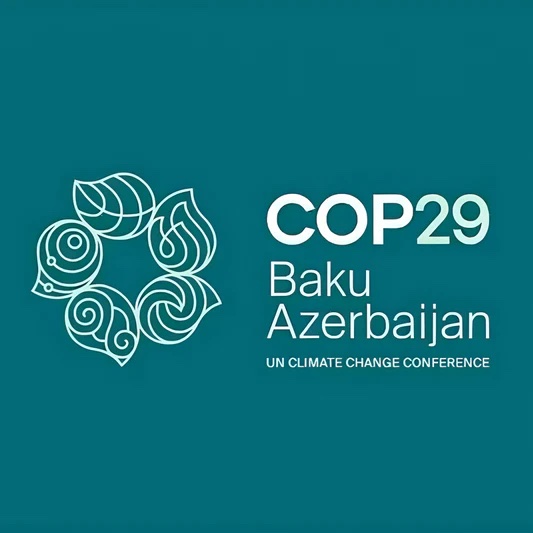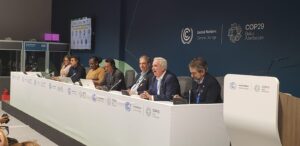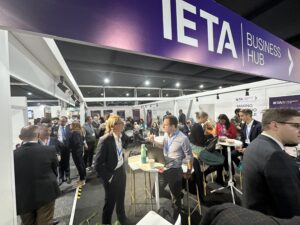COP29 update: Day 6, 16 November

Greetings from Baku!
There were a few sore heads and a few absences (which we barely noticed, really) from the IETA pavilion today after last night’s Nightcap Party celebrating IETA’s 25th birthday. The delegation pavilion hall was also noticeably quieter on Saturday, though perhaps that was because the annual changing of the COP guard has started. We’ll see quite a few fresh new faces on Monday, including ministers who’ll fly in to try to unlock progress on some of the more contentious issues.
Early discussions on the COP29’s final cover text have taken place, with observers noting concern among some Parties that certain countries may be seeking to water down references to last year’s Global Stock Take language on doubling and trebling of renewable energy and energy efficiency, and a transition away from fossil fuels.
And because the cover text deals with all the main outcomes from the COP, this debate over reiterating the GST language in this year’s top-level document may begin to “cross-fertilise” into the discussions on finance, which are even more contentious.
Negotiations over the New Collective Quantified Goal for climate finance continued late into the night on Friday and deep into Saturday. Observers reported that there was plenty of debate over the definitions of the words “provide” and “mobilise” in reference to funding sources, and where each stood in terms of priority. But these talks have also seen the addition of a third word, “facilitate”. Some Parties felt this was in essence another version of “mobilise”.
There is of course still no agreement on the sums of money that should be provided, but discussions indicate that the number of $1 trillion is taking centre stage. “I think there is a general agreement that $1 trillion is an important number, and that it should play a role in some way, shape or form in these negotiations,” one observer said. “I don’t think we’d be surprised if we saw it in the text, or even $1.3 trillion.”
And the disagreements over who should pay rumble on. Some Parties also want the eventual total to lean more heavily on private finance, while others are insisting that public funds need to represent the bulk of the sum.
And while the NCQG discussions continue, the G20 leaders will be meeting in Rio de Janeiro next week. UNFCCC executive secretary Simon Stiell addressed the Rio summit in a letter, saying they must send “crystal-clear global signals” of support for the climate finance effort.
Stiell was backed up by a coalition of business groups, who criticised the “lack of progress and focus” in the Baku summit, and called on the G20 to “deliver the policies for an accelerated shift from fossil fuels to a clean energy future, to unlock the essential private sector investment needed.”
Finally, as you’re no doubt aware, the election of Donald Trump to the presidency has raised the spectre of a second US withdrawal from the Paris Agreement, and Argentina’s president Javier Milei has hinted that he might do the same. But support for the Paris treaty has emerged this week from an unexpected quarter: Russia.
Boris Titov, President Vladimir Putin’s special representative for international cooperation in sustainability, told Bloomberg that he hopes President Trump “will not make spontaneous decisions that will harm the climate agenda”.
“There are some voices in Russia calling for the withdrawal from the Paris accord,” Titov said. “This is wrong. There is no way back.”

| Dirk Forrister spoke on Saturday at IETA’s UNFCCC official side event at COP29, Protecting Tropical Forests Through Carbon Markets. |
In the negotiations
The contact group for Article 6.2 met on Saturday morning to go through the latest draft text, but there seemed to have been little agreement on any of the outstanding issues.
Early in the afternoon the meeting broke up, with our observers noting that the draft text is not agreed by Parties as it does not yet represent consensus among Parties.
The contact group on Article 6.4 also convened, and it seemed for a while that Parties were happy to forward the text to the SBSTA plenary later today.
However, the Like-Minded Developing Countries – a group that includes China, India, Indonesia and Saudi Arabia amongst its 24 members – opposed forwarding the draft, and asked for more time to “coordinate” before sanctioning the forwarding of text to CMA.
The hold-up was unexpected, principally because LMDC hadn’t signalled its intent to stall the talks, but long-term observers noted that it’s not unusual for the group to try to hold up progress in order to extract procedural leverage in other work streams at this stage.
Happily, at a late-night closing SBSTA plenary, the draft texts for both Articles 6.2 and 6.4 were forwarded to the CMA next week for further work with decisions confirming that Parties had not reached consensus on either item.
(Possibly coincidentally, discussions on the Sharm el-Sheikh Mitigation Ambition and Implementation work programme in SBI and SBSTA were postponed to COP30 after the LMDC and Arab Group insisted on applying Rule 16 of the UNFCCC draft rules of procedure, in the face of opposition from many other groups and countries, who expressed a wish to continue the negotiations next week.)
The latest texts for Article 6.2 and Article 6.4 are available on the UNFCCC website.
Commenting on the Article 6 discussions, Japan said “both [6.2 and 6.4] texts have been substantially streamlined, but require further discussion. Both drafts still have issues, but we hope all views can be reflected in a balanced manner. The outcomes of this year should include establishment of connection between registries to enable enhanced transparency, to avoid double counting, to ensure environmental integrity.”
Unfortunately, the SBSTA draft text on matters relating to the Clean Development Mechanism was not forwarded to CMA next week, but instead will be included in the provisional agenda for the next session, in accordance with Rule 16 of the draft rules of procedure.

IETA’s Business Hub has been a popular meeting place for delegates all week.
Saturday at the IETA Business Hub
A slimmed-down schedule at the Business Hub on Saturday allowed IETA’s staff to fan out across the COP29 venue and participate in numerous side events.
This included IETA’s official UNFCCC side event, co-hosted with The Nature Conservancy among others on Protecting Tropical Forests Through Carbon Markets, and a session hosted by the Article 6.4 Implementation Partnership, where we were pleased to hear from some host countries on the process they are putting in pace for the issuance of ITMOs.
Monday at the IETA Business Hub
Many of the events hosted at the IETA Business Hub will be webcast – just click on the links to participate! All event times are listed in Azerbaijan time (AZT), which is three hours ahead of Central European and four hours behind Singapore time.
IETA’s BusinessHub is located in Area E, Pavilion H6, in the Blue Zone. We’re close to the pavilions of Georgia, Moana Blue Pacific and Namibia.
The COP29 venue will be closed on Sunday and so no side events will be taking place.
We will resume our programme on Monday at 1300 AZT (1000 CET) with a session hosted by ICROA, in which speakers will make the case for clean cookstoves as a source of emission reductions as well as host of sustainable development benefits. You can watch this event here.
At 1400 AZT our friends at GIZ will delve into the potential for significant abatement potential of sulfur hexafluoride and how carbon market mechanisms can help. Virtual attendees can join here.
We’re delighted to welcome Peru’s ministry of climate change back to the IETA Business Hub at 1600 AZT. MINAM will present the new provisions for the operation of the National Registry for Mitigation Initiatives (RENAMI), which is an important step to regulate the development of projects in the country and establish the framework for ITMOS transactions under Article 6 of the Paris Agreement. Watch this online here.